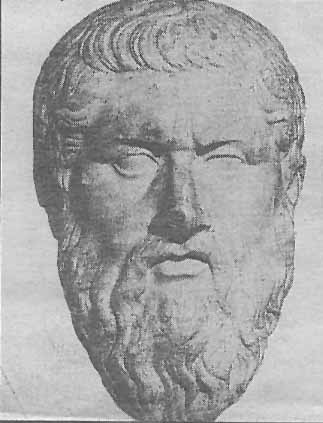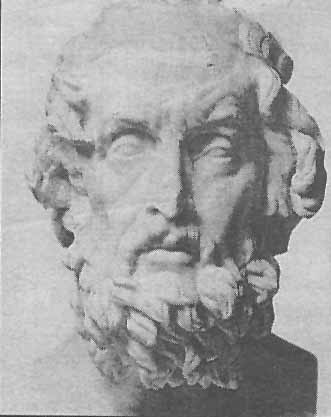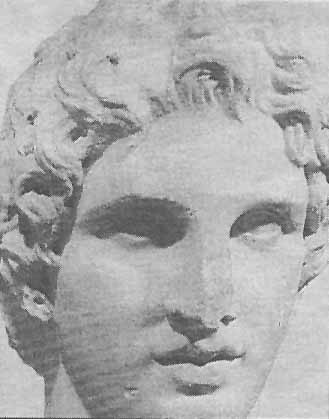 |
|
|
The Greatest Greeks of Antiquity
|
|
|
It is important for Hellenism and also a great personal pleasure to regularly remind ourselves of the most prominent Greeks of antiquity whose works are responsible for the great golden age of Greece and a civilization that even today has never been equaled for its philosophy, art and playwrights.The works of these great Greeks (and here I'm writing about only eight of them (out of several eligible hundreds) constitute significant landmarks to which the scholarship community of the world refers, and also influences the ordinary man and woman in search of. knowledge and inspiration.
|
|
And as Michael Toubis publications (which has more than 50 excellent books on the subject) lyrically writes:"For the fortunate it is a luminous milestone late any voyage of the mind." |
 Plato |
|
The first such prominent Greek,of course, was Plato (427-347 B.c.) My philosophy professor at Harvard Alfred North Whitehead always reminded us that all philosophy since it is just a footnote to Plato. Plato is the most significant thinker of antiquity to devote his entire life to philosophy, first a devoted pupil of Socrates and later founding his own school of philosophy at the Academy of Plato. (Incidentally, Pan Aristophron, an eccentric uncle of mine, excavated Plato's ancient acadmy in 1932). Plato held far-reaching views on the creation of the world, which have been preserved in the dialogue Timaeus, and his work in the Republic dialogue, is perhaps the world's most important political science text. Alexander the Great (350-323 B.C.) was the son of Phillip II arid Olympias. Daughter of the king of Epiris. He succeeded his father to the throne in 330 B.C. and historians agree he was perhaps the most successful army commander of all times as well as the most important political figure of his era. At the head of the military forces of the AIlied Greek city-states, he campaigned against Persia and conquered Asia. In short, Alexander succeeded in subjugating a large portion of the then known world and unifying it in one vast Empire. He died in Babylon at the age of 32 after an eight day drinking binge and was finally buried in Alexandria, Egypt. Aristotle (384-322B.C.) was next to Plato the greatest philosopher of antiquity. He comes to Athens at the age of l8, and became a pupil of Plato at his famous academy where he studied for 20 years. After Plato's death Aristotle Established a school of rhetoric in Athens. In 342 B.C. he was invited by King Philip of Macedonia to undertake the education of his son Alexander, then 13 years old. Aristotle exerted a great influence on Alexander and Alexander was always grateful to his grea teacher. |
|
 Homer |
Aristotle was a prolific writer. He wrote a total of 400 hundred works, an encyclopedia of philosophical and scientific writings. These writings include books of logic, metaphysics, geology, ethical and political writings and books on aesthetics and literature. |
|
Aristotle wrote extensively about the Golden Mien as away of life, and he is known for his philosophy about art not just as a form of aesthetics but as a form of basic knowledge of life.
Sappho (840~568 B.C.) is the most famous female lyric poet of the ancient Greek world and possibly the first prominent woman poet of the world. Her poetry is distinguished by intense emotion, passion and eroticism. When I was in Lesbos, her birthplace, during the war I was introduced to some of her saying by the inhabitants. Among these were: "A handsome man is handsome as he stands before you but a kind man remains comely later and forever." "I am not one of those who feel rancor. I am gentle and the soul within my breast knows no rage." Sappho founded a school of music and poetry for girls and women whom the political mores of the era condemned to ignorance.Sappho was one of the world's first feminists. The ancient Greeks hold and admire Sappho. They called her the nightingale of Lesbos. Thucydis (46'0-395 B.c.) was the greatest historian of antiquity owing to the unique work he left us: The History of the Peloponnesian War. He was the first historian who applied serious scientific methodology to the gathering of material and the interpretation of historical events. His great history portrayed the devastating repercussions that repercussions that paralyzed the most important cities of Hellenic antiquity in Athens and Sparta as well as the smaller ones involved in both sides. In addition to being a great historian, Thucydidiss is written about as having one of the outstanding minds of all ages and his influence on thosed who came after him is unparalleled in history. He is also known by saying: "All men by nature tend toward wrong doing in both private and public life and there is no law that can prevent this." Listen to the news these days and say how very true. Pericles (495-429 B.C.) was the greatest politician of Ancient Greece and leader of Athens for over thirty years. Pericles introduced democracy to Greece, contributed to the flourishing of the arts and endowed Athens with the help of the great sculptor Phidas, with the world's most magnificent monuments of art and civilization. This era is rightfully known as the golden age of Pericles.Two of his sayings are:"Knowing that happiness means freedom and freedom means valor, you must no cower before the danger of war" and "We are lovers of beauty without extravagance and lovers of wisdom without effeminacy. |
|
 Alexander the Great |
Eyripides (480-407 B.C.) wrote 92 dramas of which 17 survive. These include the famous Medea, Electra, the Trojan Women, Helen and Orestes. Though of philosopher's disposition, Euripides preferred poetry to prose to promote his philosophy and way of life among other things, his mistrust of religious tradition. |
| Using psychological analyses (some critics say Euripides was our first psychologist), he attempted to bring man face to face with himself and his problems (and without a psychological couch!) He conceived the tragic state of life as something that results from the conflict between individuals of different temperaments. Among his sayings:"Coward are nothing everywhere." "When we are giving advice, we are all wise" "Fear old age; it does not come alone." And how true. Homer (early 8th Century B.C.) Scholars and even most poets agree that Homer is the greatest poet who ever lived. Born either on the Aegean island of Chios or the city of Smyrna in Asia Minor, he composed at least two great poems, the Iliad and the Odyssey, works acknowledged world wide as unequaled master-pieces. after the 5th century B.C. his work was studied at schools and his aphorisms were known throughout Greece. Plato remarked it was to Homer that Greece owed it learning. His aphorisms include:"Beware of Greeks even if they bear gifts,""Always to be the best, and to be distinguished above the rest." |
|
About the Author |
|
|
|
|
2000 © Hellenic Communication Service, L.L.C. All Rights Reserved. http://www.HellenicComServe.com |
|
